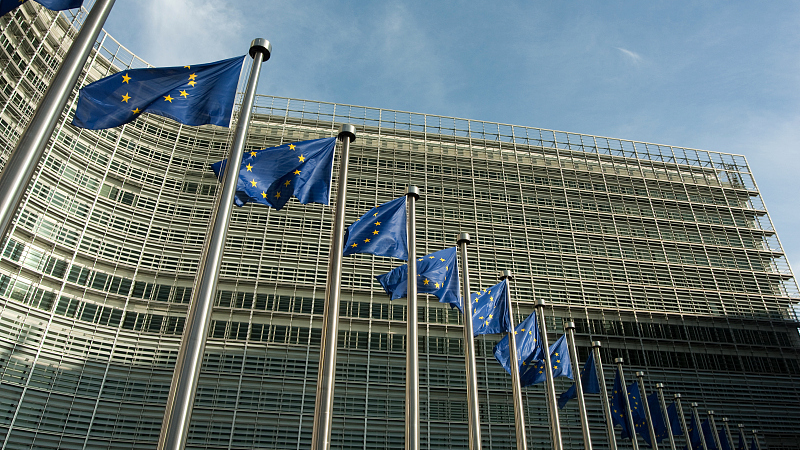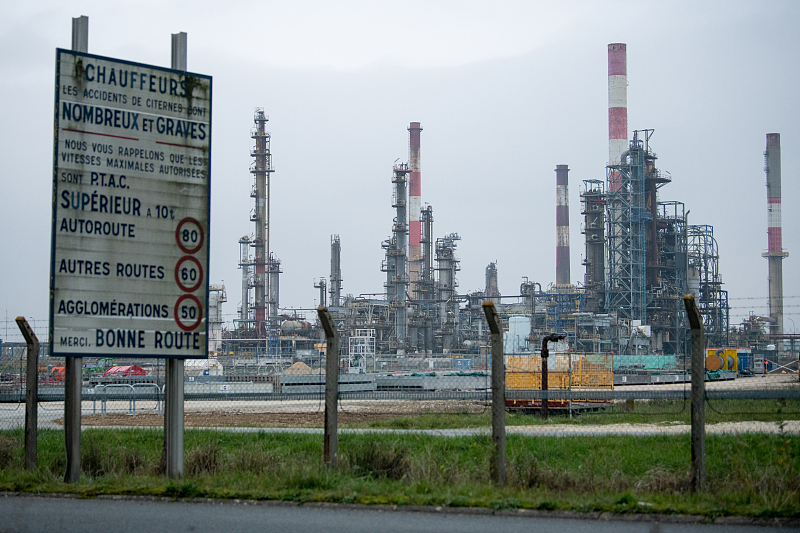
Editor's note: Song Xin is the CEO of Sinnvoll Consulting and a former policy advisor at the European Parliament. The article reflects the author's opinions and not necessarily the views of CGTN.
It's been almost a year into the Russia-Ukraine crisis. After a year of instability, uncertainty and growing risks of a potential recession across Europe, it seems high time for the EU to rethink how to tackle the difficult situation. Or to put it more precisely, there are three key challenges ahead of the summit: Recessionary pressures in the short term, industrial losses in the medium term and strategic autonomy in the long term.
Since the beginning of the war, the EU has confronted a serious energy crisis. Due to its high dependence on Russian oil and gas and several waves of sanctions imposed on Russia by the Western countries, the EU had to bear the bitter consequences of skyrocketing energy prices. European households and businesses have been hardest hit by this form of imported inflation. The authorities at the EU and national level had to impose an additional solidarity tax on energy companies and resort to borrowing again to provide some subsidies to vulnerable families and industries.
But this approach is unsustainable for two reasons. First, unlike the U.S., which is self-sufficient in energy, the EU, or at least most of its member states, still relies on imported gas and oil. Despite all the EU's current efforts to make the transition from fossil fuels to renewable energies, it would take some time before the EU could get rid of the energy dependency problem. Nevertheless, inflation is pushing Europe to the brink of an economic crisis, a recession.
Furthermore, borrowing itself is not a long-term approach. As the European Central Bank has tightened monetary policy to fight double-digit inflation, interest rates have been raised several times since last year. This means that the more European governments borrow, the more they will have to pay back in the future.

Chimneys and flare stacks at the TotalEnergies SE Grandpuits oil refinery in Grandpuits-Bailly-Carrois, France, December 1, 2022. /CFP
Chimneys and flare stacks at the TotalEnergies SE Grandpuits oil refinery in Grandpuits-Bailly-Carrois, France, December 1, 2022. /CFP
In terms of the medium-term challenges that Brussels may face, the EU lacks a real industrial strategy compared to China or the U.S. Especially now, after the U.S. passed its CHIPS and Sciences Act together with the Inflation Reduction Act, industries from all over the world, especially from the Old Continent, have been driven by the promised subsidies and tax breaks, which amount to $369 billion, subsidizing products from batteries to electric cars, solar panels and wind turbines. BMW, for example, has just announced that it will invest 800 million euros ($858million) in Mexico to set up a new electric car and battery factory, and other giants such as BASF and Siemens are planning to follow suit.
Washington's objective is clear: They seek to reshape the global value chain and want the U.S. to be the ultimate superpower on the world stage. The EU must rethink its policies to prevent more companies from leaving the continent. This is apparently what EU leaders plan to discuss at the special summit in Brussels on February 9-10.
In the long term, the most pressing question for the EU is how to achieve strategic autonomy. If the war between Russia and Ukraine was the wake-up call, decision-makers should become aware that it is not enough to be energy independent. The EU has to build up its own technological and military power, and thus a broader normative power. This can't be done in a few months or years.
Instead, this long-term goal must be implemented with detailed plans and projects. Last year, with the initiative of French President Emmanuel Macron, there was this tentative attempt to build a geopolitical community across Europe, beyond the administrative borders of the EU, with the aim of reuniting more European countries. That was the starting point, but the EU should do more.
The U.S. has challenged the current multinational governance structure by marginalizing the UN and the World Trade Organization. This would not be in the EU's interests. The EU has invested into building and maintaining the global multilateral governance structures. What the EU wants is to reform the current institutions and rules, not to make some revolutionary changes or reversals.
The special summit in Brussels this week will provide an excellent platform for open internal changes and discussions. The clock is ticking and the window of opportunity will not remain open for long.
(If you want to contribute and have specific expertise, please contact us at opinions@cgtn.com. Follow @thouse_opinions on Twitter to discover the latest commentaries on CGTN Opinion Section.)